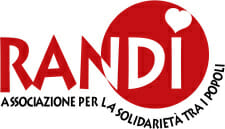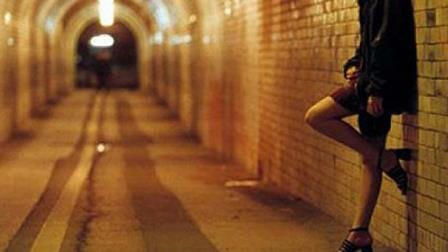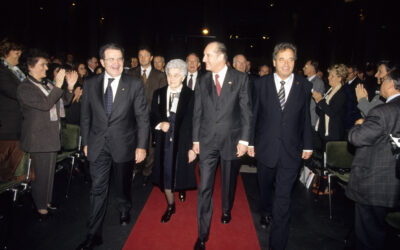 Sister Tina Ventimiglia, a Franciscan Sister of the Poor, and Resi and Alessandra, volunteers of the Randi Association, find unimagined ways to contact and accompany victims of human trafficking, and to rescue them. Prevention plays an important role, through the creation of opportunity for development in the southern hemisphere of the world.
Sister Tina Ventimiglia, a Franciscan Sister of the Poor, and Resi and Alessandra, volunteers of the Randi Association, find unimagined ways to contact and accompany victims of human trafficking, and to rescue them. Prevention plays an important role, through the creation of opportunity for development in the southern hemisphere of the world.
Yesterday, February 8, 2015, coincided with the liturgical feast of Saint Josephine Bakhita, a Sudanese woman who, as a child, had a dramatic experience of slavery. This was the day chosen as the day for the first International Day of Prayer and Awareness Against Human Trafficking. It was meant to break the silence on this “shameful wound that has no place in civil society.” That is how Pope Francis defined the phenomenon during the Angelus, with his heart full of sorrow for the multitude of “men, women and children,” “who are enslaved, exploited, abused, used as instruments of work or pleasure, and often tortured and humiliated.” He called on governments to eradicate the causes.
It is significant that the first to raise the voices against this ‘modern’ and unacceptable form of slavery were the Religious men and women who are spread across the world, and often the first and only ‘Good Samaritans’ who are able to reach out to those whose personal freedom has been violently robbed from them by those who have taken taking full possession of their lives and made them slaves.
The experience of Tina Ventimiglia, a Franciscan Sister of the Poor was particularly meaningful. For twelve years she and her community have taken on the task of reaching out to girls living on the streets in Pistoia, Italy. “Illegal immigration and forced labour,” she says, “often has the countenance of a woman, the victim of so-called ‘protectors’. These fearful, suspicious or dismissive faces of those who no longer trust anyone strongly challenge us. In the light of what our founder taught and the charism of Chiara Lubich, we don’t see them as something to run away from, to cast off, throw away or, even worse, to condemn – we see them as ‘wounds’ of Christ in need of healing. You don’t need to ‘fight’ evil, but ‘pass over it’ by exercising ‘emptiness’, accepting the person just as she or he is, worthy of love, regardless of the situation they are in. Love never counts the cost, but loves without measure and continues to love even when it is not accepted or understood. And love also makes us understand which concrete steps we can take, like the path of health care, or legal assistance in order to restore someone’s identity by obtaining legal documents for them. We also offer support in processing their experiences and discovering inner resources for carrying on with their lives, making them feel that they are both worthy of love and capable of loving. We never neglect to help them find a network of people with whom they can have healthy relationships that will allow them to insert in local community, workplace and independent living.
 Alessandra: “Randi is the baby girl who was born to Rebecca twenty two years ago in the hospital where I was working. She immigrated illegally to Livorno, Italy, and didn’t speak any Italian. But her anguish was apparent since, not having a Visitor Visa, she feared baby would be taken away from her. Welcoming her without judgement or prejudice, we were able to work out a solution for her. After a very short time more than seventy girls in similar or worse situations knew they could count on our association, which we named ‘Randi’.”
Alessandra: “Randi is the baby girl who was born to Rebecca twenty two years ago in the hospital where I was working. She immigrated illegally to Livorno, Italy, and didn’t speak any Italian. But her anguish was apparent since, not having a Visitor Visa, she feared baby would be taken away from her. Welcoming her without judgement or prejudice, we were able to work out a solution for her. After a very short time more than seventy girls in similar or worse situations knew they could count on our association, which we named ‘Randi’.”
“What do we do?” Resi asks. “We often find ourselves in front of situations of slavery for economic gain. This is a business that moves a market of 24 billion euros and involves between 27 and 50 million human beings across the globe, most of them women and children. It is a real and very frightening trafficking that creates fear, isolation, and the inability to defend oneself against it in any way. Around half of the trafficking involves young women forced into prostitution. It really is not easy to draw near to these enslaved individuals who are carefully prevented from contact with the outside world. Sometimes we meet them by accident, when they come for treatment at hospital, or when we meet on a train. When they do come into contact with us, the spirituality of unity helps us to convey to them that they finally have someone they can trust. And this is where the miracle occurs, because perhaps for the first time they aren’t being asked for anything in return.”
Healing wounds is the great challenge of the Gospel. But we should also prevent them whenever possible. And this is the side that has been taken by crowds of men and women Religious who travel with the Good News to foreign lands where they promote the dignity of the person. The Focolare is doing the same in 53 countries on 4 continents, they are operating more than 100 development interventions that allow 15,000 children and their families to create concrete development opportunities that are spent in their own lands, in freedom.




0 Comments